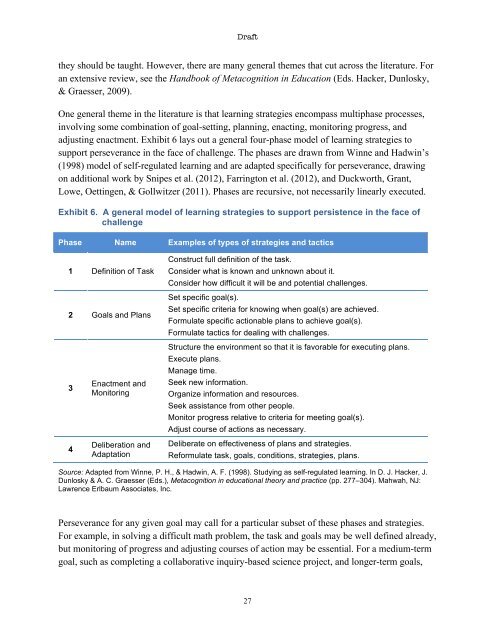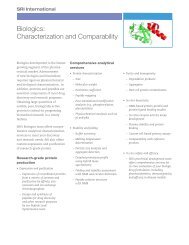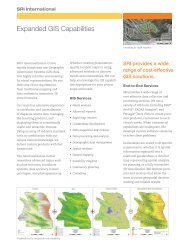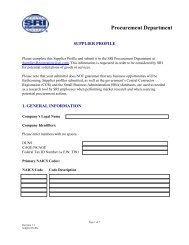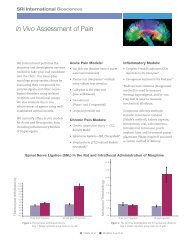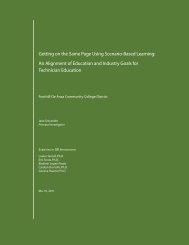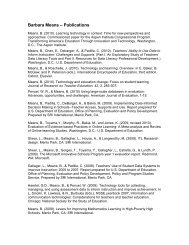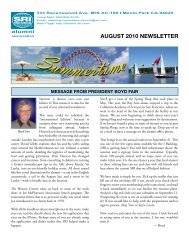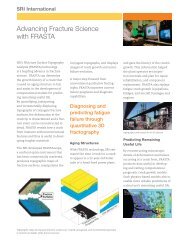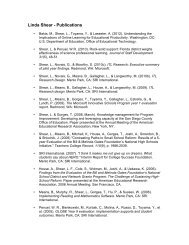Promoting Grit, Tenacity, and Perseverance - U.S. Department of ...
Promoting Grit, Tenacity, and Perseverance - U.S. Department of ...
Promoting Grit, Tenacity, and Perseverance - U.S. Department of ...
You also want an ePaper? Increase the reach of your titles
YUMPU automatically turns print PDFs into web optimized ePapers that Google loves.
Draft<br />
they should be taught. However, there are many general themes that cut across the literature. For<br />
an extensive review, see the H<strong>and</strong>book <strong>of</strong> Metacognition in Education (Eds. Hacker, Dunlosky,<br />
& Graesser, 2009).<br />
One general theme in the literature is that learning strategies encompass multiphase processes,<br />
involving some combination <strong>of</strong> goal-setting, planning, enacting, monitoring progress, <strong>and</strong><br />
adjusting enactment. Exhibit 6 lays out a general four-phase model <strong>of</strong> learning strategies to<br />
support perseverance in the face <strong>of</strong> challenge. The phases are drawn from Winne <strong>and</strong> Hadwin’s<br />
(1998) model <strong>of</strong> self-regulated learning <strong>and</strong> are adapted specifically for perseverance, drawing<br />
on additional work by Snipes et al. (2012), Farrington et al. (2012), <strong>and</strong> Duckworth, Grant,<br />
Lowe, Oettingen, & Gollwitzer (2011). Phases are recursive, not necessarily linearly executed.<br />
Exhibit 6. A general model <strong>of</strong> learning strategies to support persistence in the face <strong>of</strong><br />
challenge<br />
Phase Name Examples <strong>of</strong> types <strong>of</strong> strategies <strong>and</strong> tactics<br />
1 Definition <strong>of</strong> Task<br />
2 Goals <strong>and</strong> Plans<br />
Construct full definition <strong>of</strong> the task.<br />
Consider what is known <strong>and</strong> unknown about it.<br />
Consider how difficult it will be <strong>and</strong> potential challenges.<br />
Set specific goal(s).<br />
Set specific criteria for knowing when goal(s) are achieved.<br />
Formulate specific actionable plans to achieve goal(s).<br />
Formulate tactics for dealing with challenges.<br />
3<br />
4<br />
Enactment <strong>and</strong><br />
Monitoring<br />
Deliberation <strong>and</strong><br />
Adaptation<br />
Structure the environment so that it is favorable for executing plans.<br />
Execute plans.<br />
Manage time.<br />
Seek new information.<br />
Organize information <strong>and</strong> resources.<br />
Seek assistance from other people.<br />
Monitor progress relative to criteria for meeting goal(s).<br />
Adjust course <strong>of</strong> actions as necessary.<br />
Deliberate on effectiveness <strong>of</strong> plans <strong>and</strong> strategies.<br />
Reformulate task, goals, conditions, strategies, plans.<br />
Source: Adapted from Winne, P. H., & Hadwin, A. F. (1998). Studying as self-regulated learning. In D. J. Hacker, J.<br />
Dunlosky & A. C. Graesser (Eds.), Metacognition in educational theory <strong>and</strong> practice (pp. 277–304). Mahwah, NJ:<br />
Lawrence Erlbaum Associates, Inc.<br />
<strong>Perseverance</strong> for any given goal may call for a particular subset <strong>of</strong> these phases <strong>and</strong> strategies.<br />
For example, in solving a difficult math problem, the task <strong>and</strong> goals may be well defined already,<br />
but monitoring <strong>of</strong> progress <strong>and</strong> adjusting courses <strong>of</strong> action may be essential. For a medium-term<br />
goal, such as completing a collaborative inquiry-based science project, <strong>and</strong> longer-term goals,<br />
27


